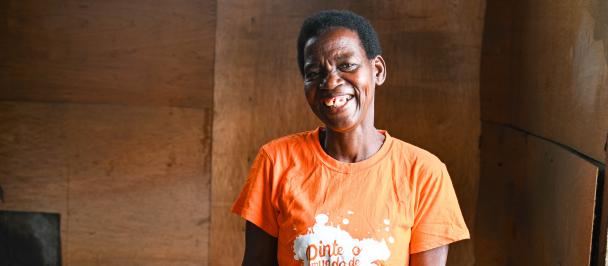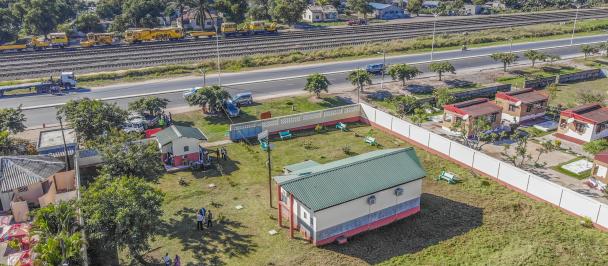Investing in climate-resilient health infrastructure pays dividends
"I had a safe place to go”
April 22, 2025

Claudia was born in Chiúre just 20 days after Cyclone Chido made landfall in Cabo Delgado, Mozambique, on 15 December 2024. Today, she is receiving her first vaccination at the Mahurunga Community Health Centre, a facility built by UNDP in partnership with the Government of Mozambique and the Global Fund to Fight AIDS, Tuberculosis and Malaria in 2023.
Located in Chiúre, Cabo Delgado’s most populous district, Mahurunga is one of three community health centres supported by UNDP that remained operational after the storm tore through the region. As a primary healthcare facility, it provides general medical consultations and services for nutrition and maternal and child health, including potentially deadly diseases like malaria.

Dr. Letícia Jomamossi, Chiúre’s Secretary of Health, personally delivered today’s vaccines. She recalls that baby Claudia and her mother, Therezinha, have been receiving care at the centre since the early stages of pregnancy.
The facility’s solar-powered refrigeration system ensures that vaccines and other temperature-sensitive medicines remain safely stored—an essential feature in a district where electricity is unreliable. When Cyclone Chido hit, winds exceeding 200 km/h severely damaged homes and public buildings. The storm displaced over 20,000 families in the area, exacerbating existing health challenges.
“Chiúre has long hosted internally displaced people. With the ongoing extremist violence in the northern districts, our population continues to grow, putting immense pressure on our already fragile healthcare system,” said Dr. Jomamossi.
Since the cyclone, more than 300 patients per week have needed services at Mahurunga alone.
“Typically, a community health centre serves around 40 patients daily,” explains Dr. Jomamossi.
“The demand on our health system is overwhelming.”

According to the District Planning and Infrastructure Service (SDPI), one of the key factors in a building’s survival was the use of resilient materials and construction techniques.
“Public buildings that remained intact had superior structural resilience,” says Melo Francisco, Director of SDPI Chiúre.
“High-quality materials and interlocking tiles helped prevent roofs from breaking apart, preserving the overall integrity of the structures.”
“Public buildings that remained intact had superior structural resilience”District Planning and Infrastructure Service (SDPI), Dr. Melo Francisco

Mozambique is one of the most climate-vulnerable countries worldwide, facing recurrent floods, droughts and cyclones such as Idai and Kenneth in 2019. Since Chido hit in December 2024, Cyclone Jude made landfall in Nampula province in March 2025.

Government of Mecufi
Cyclone Chido alone affected nearly half a million people, resulting in 120 fatalities and 868 injuries. It destroyed 52 health centres—exposing the fragility of infrastructure and essential services, particularly healthcare.
The climate-induced shock compounded Cabo Delgado’s protracted crisis—marked by conflict, displacement and weakened institutional capacity—and deepened systemic vulnerabilities, especially for women and girls exposed to gender-based violence and HIV.
Since 2019, UNDP Mozambique has supported the Ministry of Health to improve access to quality healthcare and enhance the resilience of health infrastructure countrywide. “Our strategy follows the ‘Build Back Better’ framework. Every construction and rehabilitation project incorporates high-quality materials and designs that can withstand future shocks,” said Victor Buene, lead engineer at Mahurunga Community Health Centre.
In addition to Mahurunga, two other community health centres in Cabo Delgado were built and equipped to withstand climate disasters, enabling access to healthcare during crises. Another ten facilities are scheduled for completion in 2025 in other provinces, with plans to install solar energy systems and smart technologies at some facilities to further address the climate crisis. The facilities are part of a broader infrastructure programme supporting medical warehouses, laboratories and centres for disease surveillance to boost resilience and recovery from future emergencies.
“Investing in resilient infrastructure means safeguarding essential services for years to come,” Buene added.
Back at Mahurunga health centre, Claudia has received her vaccinations. Preparing to leave, her mother straps Claudia to her back using a colourful capulana and thanks the health workers who provided prenatal consultations.
“When the cyclone hit, we lost our home and had to rebuild it before I gave birth. I was fortunate to have received prenatal care and access to clean water, which helped me deliver a healthy baby girl,” Therezinha recalled.
“Knowing that the health centre was still standing and fully operational gave me peace of mind—if anything happened, I had a safe place to go.”
As climate change, conflict and displacement threaten health in Mozambique, bold investment in the Global Fund’s Eighth Replenishment is needed to protect progress made. UNDP and partners will stop at nothing to safeguard health systems and services in Mozambique to leave no one behind and achieve the Sustainable Development Goals by 2030.

 Locations
Locations



